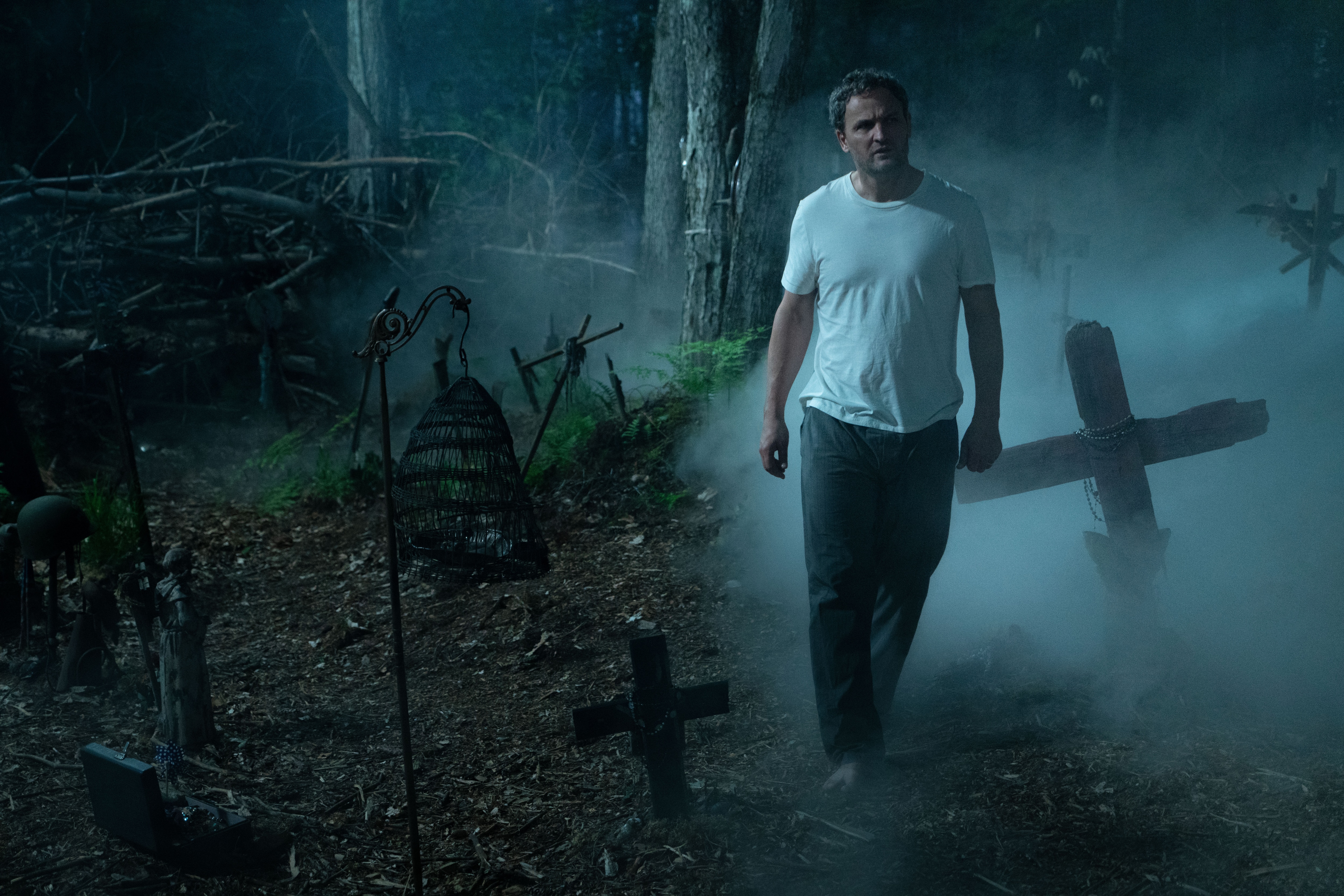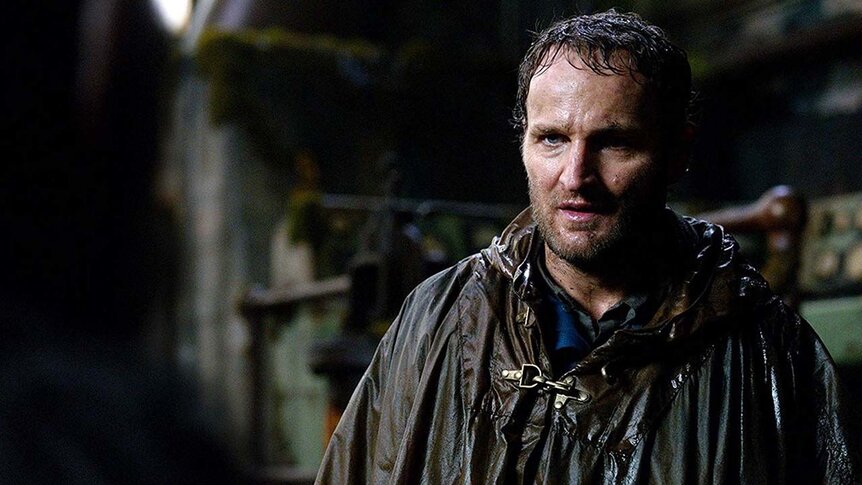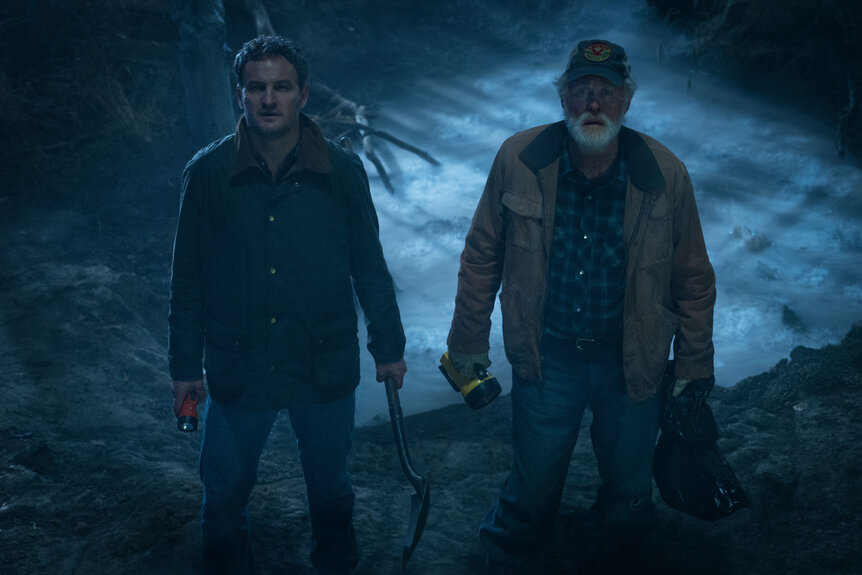Create a free profile to get unlimited access to exclusive videos, sweepstakes, and more!
Pet Sematary's Jason Clarke explains how Stephen King's original novel informed his performance

Stephen King didn't pull any punches when it came to what he threw at his lead character in Pet Sematary. Louis Creed is put through the wringer physically and emotionally, and this new adaptation from co-directors Kevin Kölsch and Dennis Widmyer doesn't softball the hell he goes through.
And that's just the way Jason Clarke wants it. After all, he's as big a fan of the book as any King fanatic out there. In fact, he was so committed that he would mainline passages from the book before shooting scenes to get him in the right mood.
SYFY WIRE spoke with Clarke at the 2019 SXSW Film Festival and covered the influence of King's novel to what he brought to the screen, what makes a good adaptation, and his hardest scenes to film.
We also touch upon a plot development that might not be known if you aren't familiar with King's book, the 1989 original movie, or have avoided all trailers for this film. So, be warned that we do talk about some plot stuff, including a twist to the original source material that the marketing has tipped its hat to — but would be a big shock if you missed it.
At the Q&A after the premiere, it was brought up that you read this particular book multiple times. Were you a King fan in advance or were those multiple readings to prepare you for the role?
I am. Yeah, I am. It's a great novel. It's a novel that washes over you in different ways, like Lord of the Rings does. Different sections will speak to you in different times. The comedy, the darkness, the shame that Louis feels. All these different things that I constantly went back to.
Another thing I'm a big fan of is Audible. Michael C. Hall does a great reading of Pet Sematary. As an actor I would listen to the description of the scene we were coming up to shoot and it just put me in (the right mindset). It was like putting on some meditative music to listen to to get you in the mood. It is Louis' inner monologue.
But yeah, dude. I must have read it close to 10 times.
Before IT came out, Bill Skarsgård said that he pulled more of his performance as Pennywise from the original text than the script. A script is all about putting on paper what will be seen and heard in the film, but it doesn't always deeply dive into each character. Novels do that, though. It sounds like you found a similar thing with your character, Louis.
Yes. You know, one of the trickiest scenes was a scene that King hasn't written. It was the scene where Louis goes upstairs and has to explain (the presence of their dead child) to Rachel. I mean, f*** me. How do you explain this without losing the audience, without going to the absurd, without going full Jack Nicholson?
I was always trying to find a way to get it across and then ultimately used a line that was Ellie's. "Let God take his own cat." Except I did it as Louis. "Let God take his own f***in' kid." That, for me, was everything.
I didn't know if they were going to use it or not, but I was very happy that they did because at the end of the day you're tapping into Louis's rage at the injustice of it all. Why do this to me and then put (the burial ground) up there if you mean for it to come back like this?
By going back to that source material it seeps into you in different ways and that came out of me. I would go through lines and things that I loved, that spoke to me in the book, and that came out when we were riffing and improvising and it really worked for me.
It's something you need to see. You see that there and when Louis is digging and he just starts to scream because he's like "F*** you all!" You gotta tap into the rage to get you through it.
His arc in the movie is being turned from a non-believer into a believer... a different kind of believer, granted.
Yeah. And getting primal. Getting very primal. It's all there. He's a great writer, King.
Besides getting you in the mood for the scenes you were about to shoot were you able to pull a better understanding of your character from the novel? I would imagine as an actor the ability to draw on not just the script but also a thick tome would be invaluable.
It's wonderful. You can't go down the rabbit hole of it too much. I think it takes a while, even for the directors, to work out how much an audience can get quickly. Visually a film can give you a lot more than a book can. It gives you something to feel rather than describing it for you. What King describes here is very upsetting. One of the most upsetting sections of the book is when he digs up his child and sees his suit and his face and he thinks he's lost his head in the moss.
It worked to move quickly through that scene (in the film). You don't need to sit there too long, like a whole chapter. That takes time to work out, even for an actor. "I've done this, it's enough."
There's a line at the beginning I hadn't heard because (Amy Seimetz) did it with ADR later. She says "We left the cat in the car." Everyone that loves the book, of course, finds that funny. We know what's coming, but it also lets the audience have a general laugh together, which opens you up for the next feeling that comes, the next emotion.
You have to be smart with narrative, particularly in the horror genre. The language of genre film gives so much away automatically. It's about finding clever ways of letting the audience feel comfortable about being emotional and being open in a room full of other people. It's such a group experience.
The key thing I see genre filmmakers mess up with is giving the audience a reason to care for the characters in peril. King is such a great character writer and I think that's one of the reasons his stuff tends translate so well to screen.
Some of them do. Some of them are still waiting to be cracked. You've really got to crack it. It's not just doing a straight adaptation. That doesn't work.
For sure, but getting the characters right is crucial to cracking that adaptation. In genre, you have to care about the characters and you have go on a ride, give them ups and downs. A laugh scene and a scare scene are eliciting a similar response, they're just on different ends of the spectrum.
Totally. Totally. It's a fine line. At the heart of this story is an absurd situation. There's no way around it. You've got to confront that. The trickiest scenes in this film are Louis going to Jud and saying "That cat was f***in' dead." It was funny, I remember John (Lithgow) and I playing that. People were like "How do you explain everything?" You don't need to explain everything. That's the point of it. People now must make the jump or not, the same way Louis has to make the jump. If you're invested enough in Louis and Jud you make the jump.
The other one is when Ellie comes back and I go upstairs to explain it. How do we get from there into the next sequence. I was twisting myself into knots about that. Really. You can drop too much. "There's a place and there are Indians and there's a Wendigo and there's this and that." How do you get it across?
Eventually, you've got to trust the audience. You've got to trust that people will get a lot more than you realize. There's a language in cinema. That's why a lot of good directors are coming out of this genre because they understand (that language).
You're right. The rules that count are the ones you establish in the universe. You can do pretty much whatever you want as long as you don't betray those rules.
If you know the rules then you can break them. If you just have a deus ex machina at the end, you think "This is stupid." And so many movies do this these days. If you've got enough money you throw that at it and you have a big action sequence that's so cool that it doesn't matter anyway. We're leaving you with a wow.
It might leave the audience feeling like they had a hollow experience...
But they don't care. There's another one coming out next week. That's why I was very proud of what the guys did. We kept searching for a way to finish this. It goes back to what King is. He's a communal, big-selling author. It's accessible. You lean into his stuff because it's enjoyable. You want to get lost in those worlds. That's what the movie has to be at the end of the day. That's what Shawshank Redemption is, that's what IT is, that's what The Shining is, and that's what Pet Sematary now is. You go in and you have an experience, which is what his books have.
We made some changes, but I think the ending works. King loved it. I think he's going to publish whatever his thoughts are that he sent out to the studio. I don't know 100 percent, but I was told that he said in an email that this was the best cast and acting that he's had in any of his movies, which is just insane if it's true. (laughs)
It feels good, though, because it was frightening telling different aspects of this story, you know? Because the jump is big.
But that big jump is the reason to make it.
It is. It totally is the reason to make it, but as an actor you know you're really going out there.




























